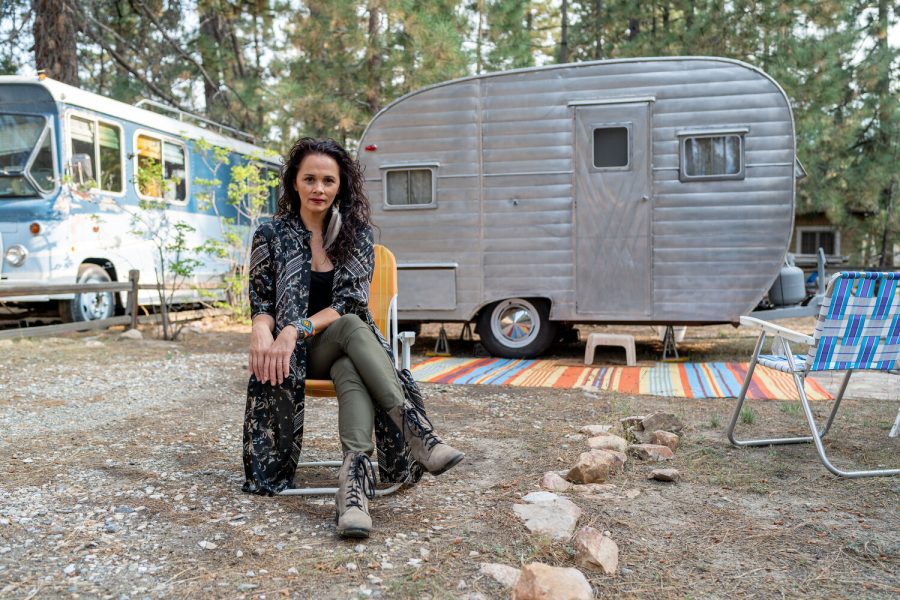On Oct. 4, playwright and MacArthur Fellow Larissa FastHorse and artistic director of Cornerstone Theater Company Michael John Garcés discussed Indigenous art and their collaborative, community-based theatrical process. The open conversation event was part of their 10-day residency at the University of Massachusetts.
The event was part of the fourth annual Art Sustainability Activism series, a program designed to connect artists with scientists and climate advocates. The conversation began with moderator Michael Sakamoto, performing arts curator at the UMass Fine Arts Center, introducing the series before asking FastHorse and Garcés about their background in theater and involvement with Cornerstone Theater Company.
Garcés joined Cornerstone, which brings theater to communities without local productions, in 2006. The company casts local, unprofessional actors and includes citizen actors’ feedback into its plays. This “decolonized process” resonated with FastHorse for her touring play “Native Nation,” a production that works to incorporate the feedback of Indigenous communities.
Garcés defines decentralized theater as work shaped by group decisions, open discourse and, “letting go of assumptions, letting go of knowing [and] letting go of expertise.”
Before she became a Native American playwright, FastHorse was a ballet dancer. After retiring from dance 10 years into her career, she entered the film industry with Universal Pictures and Latham Entertainment.
FastHorse explained her frustration with the film industry’s depiction and treatment of indigenous peoples. “Arts have always been an extraction industry with indigenous people; they come in and they take,” FastHorse said.
FastHorse emphasized her desire to include other Indigenous art, people and communities in her work. The Cornerstone Theater Company gave her the opportunity to implement this practice with “Native Nation,” which mixes theater with food and markets.
The conversation then switched to the details of Cornerstone’s approach and focus on community involvement. Garcés told the audience the key is to let the community control every aspect of the production; he offers to change any part of the performance up to, and even after, the first show. As director, Garcés leads from beside or behind the cast and community rather than up front.
“Their way of working together is so different from how we are trained,” said Hillary Rathbun, Fine Arts Center program manager. “When they’re talking about the role of director and the top-down leading verse leading behind. There’s so much listening and it’s a big part of the core of the process.”
When working with Indigenous people on reservations, FastHorse says that the production acts as vehicle to serve the community in other ways. Cornerstone has cooked dinners, fixed the homes of elders and provided clothes for children in emergency foster care during production. FastHorse and Garcés engage the community with grassroots methods: they knock on doors, explain the project, receive any feedback and continue to wander.
During the question-and-answer period, many audience members wondered how FastHorse and Garcés navigate conflicts with community members with their circular process. Garcés explained the main tactic is to circle back and discuss solutions with the community.
FastHorse gave an example of one production that included a cultural song and dance where multiple people from the same tribe disagreed on the details of the dance. The Cornerstone staff asked the community for the authority to mediate this issue, and indigenous cast members referred FastHorse to a specific elder who decided the situation.
“That’s not time wasted at all,” Garcés said, referring to this method. “That is part of the process of making the play.”
Garcés and FastHorse will remain at UMass collecting stories and working with the community to apply this process on campus and refine decolonized curricula.
“[On Oct. 7] there will be about 15 of us who Michael and Larissa will come to and they will greet us just the way they do communities,” said Laura Doyle, co-director of the World Studies Interdisciplinary Project
Watch the conversation on the UMass Fine Arts Center YouTube.
Emilee Klein can be reached at [email protected] and followed on twitter @emileekleinn.



















